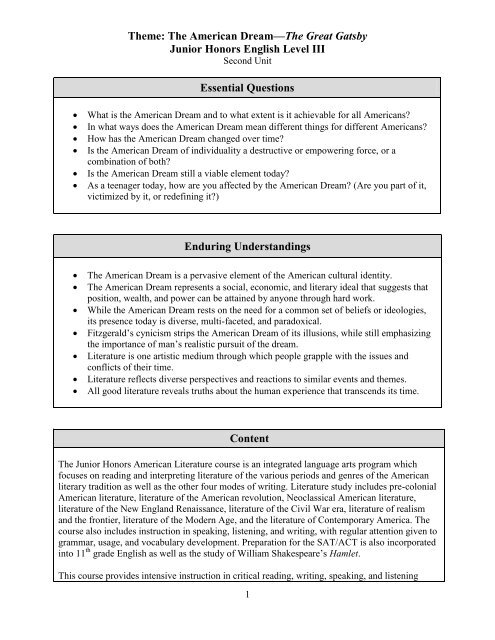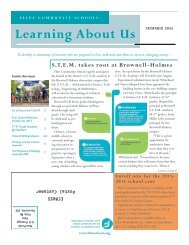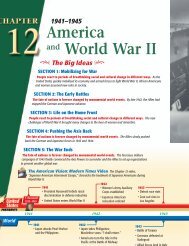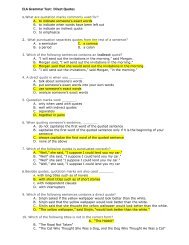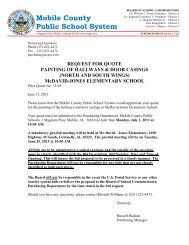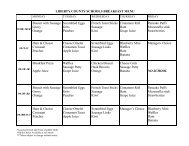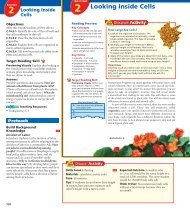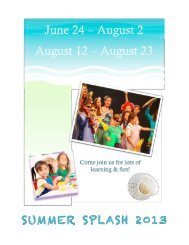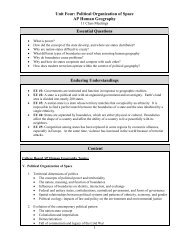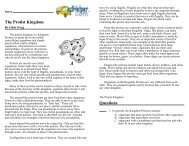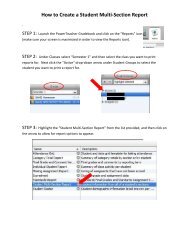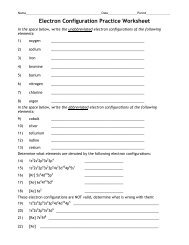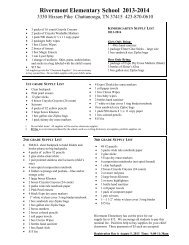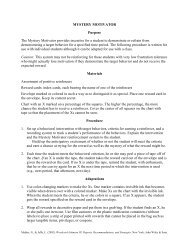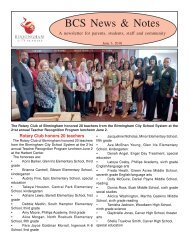Theme: The American Dream—The Great Gatsby Junior Honors ...
Theme: The American Dream—The Great Gatsby Junior Honors ...
Theme: The American Dream—The Great Gatsby Junior Honors ...
You also want an ePaper? Increase the reach of your titles
YUMPU automatically turns print PDFs into web optimized ePapers that Google loves.
<strong><strong>The</strong>me</strong>: <strong>The</strong> <strong>American</strong> Dream—<strong>The</strong> <strong>Great</strong> <strong>Gatsby</strong><br />
<strong>Junior</strong> <strong>Honors</strong> English Level III<br />
Second Unit<br />
Essential Questions<br />
What is the <strong>American</strong> Dream and to what extent is it achievable for all <strong>American</strong>s?<br />
In what ways does the <strong>American</strong> Dream mean different things for different <strong>American</strong>s?<br />
How has the <strong>American</strong> Dream changed over time?<br />
Is the <strong>American</strong> Dream of individuality a destructive or empowering force, or a<br />
combination of both?<br />
Is the <strong>American</strong> Dream still a viable element today?<br />
As a teenager today, how are you affected by the <strong>American</strong> Dream? (Are you part of it,<br />
victimized by it, or redefining it?)<br />
Enduring Understandings<br />
<strong>The</strong> <strong>American</strong> Dream is a pervasive element of the <strong>American</strong> cultural identity.<br />
<strong>The</strong> <strong>American</strong> Dream represents a social, economic, and literary ideal that suggests that<br />
position, wealth, and power can be attained by anyone through hard work.<br />
While the <strong>American</strong> Dream rests on the need for a common set of beliefs or ideologies,<br />
its presence today is diverse, multi-faceted, and paradoxical.<br />
Fitzgerald’s cynicism strips the <strong>American</strong> Dream of its illusions, while still emphasizing<br />
the importance of man’s realistic pursuit of the dream.<br />
Literature is one artistic medium through which people grapple with the issues and<br />
conflicts of their time.<br />
Literature reflects diverse perspectives and reactions to similar events and themes.<br />
All good literature reveals truths about the human experience that transcends its time.<br />
Content<br />
<strong>The</strong> <strong>Junior</strong> <strong>Honors</strong> <strong>American</strong> Literature course is an integrated language arts program which<br />
focuses on reading and interpreting literature of the various periods and genres of the <strong>American</strong><br />
literary tradition as well as the other four modes of writing. Literature study includes pre-colonial<br />
<strong>American</strong> literature, literature of the <strong>American</strong> revolution, Neoclassical <strong>American</strong> literature,<br />
literature of the New England Renaissance, literature of the Civil War era, literature of realism<br />
and the frontier, literature of the Modern Age, and the literature of Contemporary America. <strong>The</strong><br />
course also includes instruction in speaking, listening, and writing, with regular attention given to<br />
grammar, usage, and vocabulary development. Preparation for the SAT/ACT is also incorporated<br />
into 11 th grade English as well as the study of William Shakespeare’s Hamlet.<br />
This course provides intensive instruction in critical reading, writing, speaking, and listening<br />
1
<strong><strong>The</strong>me</strong>: <strong>The</strong> <strong>American</strong> Dream—<strong>The</strong> <strong>Great</strong> <strong>Gatsby</strong><br />
<strong>Junior</strong> <strong>Honors</strong> English Level III<br />
Second Unit<br />
through literary analysis of the genres of drama, fiction, nonfiction, and poetry. Students will be<br />
familiarized with the literary conventions which appear in their assigned readings and be given<br />
the opportunity to practice these conventions in the expository, persuasive, self-expressive and<br />
literary modes of composition.<br />
21 st Learning Expectations<br />
Students:<br />
Read and write effectively for a variety of purposes<br />
Speak effectively with a variety of audiences in an accountable manner<br />
Use technology responsibly to create, research, synthesize, and communicate<br />
information fluently<br />
Take responsibility for their own learning and behavior<br />
Value human, cultural and natural diversity<br />
21 st Century Learning Skills<br />
21 st Learning skills in the Language Arts classroom include:<br />
Information and communication skills which include media literacy, information literacy<br />
and ICT literacy.<br />
Thinking and problem-solving skills which include critical thinking, problem<br />
identification formulation and solution, creativity and intellectual curiosity specific to the<br />
unit genre<br />
Interpersonal and self-directional skills which include both Flexibility and Adaptability<br />
with regard to cooperative groupings and pairings, and literature circles<br />
Initiative and Self-Direction<br />
Social and Cross-Cultural Skills<br />
Productivity and Accountability<br />
Leadership and Responsibility<br />
2
<strong><strong>The</strong>me</strong>: <strong>The</strong> <strong>American</strong> Dream—<strong>The</strong> <strong>Great</strong> <strong>Gatsby</strong><br />
<strong>Junior</strong> <strong>Honors</strong> English Level III<br />
Second Unit<br />
Connecticut State Standards<br />
Content Standard 1.1 Students use appropriate strategies before, during and after reading<br />
in order to construct meaning.<br />
Content Standard 1.2 Students interpret, analyze and evaluate text in order to extend<br />
understanding and appreciation.<br />
Content Standard 2.4 Students recognize that readers and authors are influenced by<br />
individual, social, cultural and historical contexts.<br />
Objectives<br />
Students will be able to:<br />
Identify characteristics of postwar “Lost Generation” writers.<br />
Discuss the effect of the Jazz Age on <strong>American</strong> society.<br />
Evaluate the effect of class distinctions—old money versus “nouveau riche”—on social<br />
interactions and perceptions in the 1920s.<br />
Analyze key symbols and symbol patterns.<br />
Describe and analyze the narrative structure of <strong>The</strong> <strong>Great</strong> <strong>Gatsby</strong>.<br />
Analyze contrasting elements in the novel.<br />
Describe their own place in the <strong>American</strong> Dream.<br />
Assessments<br />
Assessment: Students will produce a 1920s’ style newspaper as a group project to<br />
illustrate their understanding of social, political, economic, moral and cultural issues of the<br />
day while reflecting the <strong>American</strong> Dream. Students will incorporate events from the novel<br />
where relevant<br />
o Rubric 1: Communication – Student reads and writes effectively for a variety of<br />
purposes<br />
o Rubric 7: Problem Solving – Student makes decisions and solves problems in<br />
collaborative settings<br />
Select a passage from the novel that emphasizes the <strong>American</strong> Dream and rewrite it as a<br />
parody reflecting contemporary society<br />
o Rubric 6: Technology – Student uses technology responsibly to create, research,<br />
synthesize, and communicate information fluently<br />
o Rubric 1: Communication – Student reads and writes effectively for a variety of<br />
purposes<br />
Reading Check Quizzes<br />
3
<strong><strong>The</strong>me</strong>: <strong>The</strong> <strong>American</strong> Dream—<strong>The</strong> <strong>Great</strong> <strong>Gatsby</strong><br />
<strong>Junior</strong> <strong>Honors</strong> English Level III<br />
Second Unit<br />
o Rubric 1: Communication – Student reads and writes effectively for a variety of<br />
purposes<br />
Multiple Choice/Short Answer Unit Test<br />
o Rubric 1: Communication – Student reads and writes effectively for a variety of<br />
purposes<br />
Other evidence of learning may include dialectical journals, story maps, group discussion,<br />
reader responses, group and panel discussions.<br />
Resources<br />
School-issued student laptops<br />
Selections from Prentice Hall Literature Common Core Edition as well as F. Scott<br />
Fitzgerald’s <strong>The</strong> <strong>Great</strong> <strong>Gatsby</strong><br />
www.shmoop.com; www.grammarbook.com<br />
Supplemental essays and articles provided by the instructor such as “Miniver Cheevy,”<br />
“We Wear the Mask,” and “Harlem.”<br />
4


